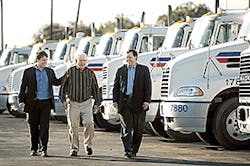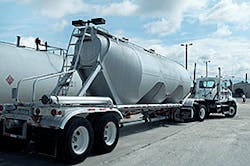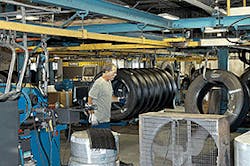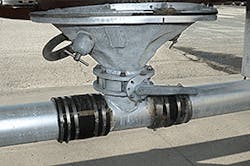CCC Transportation remains a dominant force serving the construction sector in the Southeast
GUY Bostick may have passed away in late August, but he is still a strong presence in the diverse trucking operation he built over roughly six decades. His influence and legacy are still at the heart of everything Auburndale, Florida-based Comcar Industries has become.
That is especially true at CCC Transportation LLC that Guy Bostick launched as Commercial Carrier Corporation (CCC) in 1953. Distinguished as the flagship carrier of Comcar Industries, CCC Transportation has become Florida’s largest intrastate motor carrier, as well as a strong truckload competitor across the Southeast.
Operations include dry bulk, dry van, and dedicated fleet services. Roughly 350 of the 410 tractors in the fleet are used in dry bulk hauling—specifically cement, fly ash, slag, and sand. The carrier currently operates about 200 dry bulkers and 20 Pigs—portable pneumatic storage bins for cement.
In 1955, Guy Bostick helped pioneer dry bulk cement delivery by truck with a fleet of 12 rigs. This move helped transform the construction industry by offering customers a faster, more economical means of transport. CCC established a Tampa terminal to support General Portland Cement Company and Ideal Cement Company—the two largest manufacturers in Florida at the time.
Presiding over CCC Transportation today is Barrett Bostick, Guy Bostick’s grandson and son of Mark Bostick, Comcar Industries president. Like his father and other family members, Barrett Bostick grew up in the family business and never thought about working anywhere else.
“This company has always been a part of my life,” he says. “Growing up, I worked summers in the maintenance shop and truck wash in Auburndale, and I spent time in the accounting department. I earned my CDL at the truck driving school once operated by our CTL Distribution logistics subsidiary. I still have my CDL.”
Return home
Following a one-year stint at Willis Shaw Express Inc, once a Comcar refrigerated carrier subsidiary based in Arkansas, Barrett Bostick took the position as director of sales at CCC Transportation. He’s been there ever since.
“I wanted to get back to Auburndale, because that was where my family lived, including my grandfather,” he says. “He spent a lot of his time at CCC Transportation even after he retired around 2003. That was his first truck fleet, after all.”
Barrett Bostick and his management team have worked hard to ensure that CCC Transportation remains a strong, viable trucking company in the southeastern US market. He says CCC Transportation’s diversified operations are performing well, he is very optimistic about the dry bulk side of the business.
“Florida was hit hard during the recession that started in 2008, with construction activity down as much as 80% in some areas,” he says. “The construction sector has recovered nicely and continues to get stronger.
“We weathered the financial storm in relatively good shape. One of the benefits of being a family business is that we are willing to tolerate a downturn with the realization that the economy will recover for the long term.
“We had a lot of dry bulkers sitting at one point, but all of them are now back on the road. We kept the bulkers even as we tightened other areas of our operation. We knew better days were ahead.”
Busy bulkers
Today, the dry bulk fleet is busier than ever, especially in Georgia and Florida. “We have a couple of big stadium projects right now in Atlanta, and we have a lot of road projects in Florida,” says Keith Harter, vice-president of operations at CCC Transportation.
He adds that the carrier’s market share and load volumes have been very good this year across its entire operation. “Across the board, our business is up from last year,” he says. “For 2016, our customers are projecting a 7% to 10% increase in business.”
CCC Transportation’s diverse operations are conducted out of 14 terminals in three states. A majority of the terminals (11) are concentrated in Florida, with two in Georgia, and one in South Carolina.
Dry bulk hauls average 50 miles and include a significant number of intra-city loads. Many of the cement deliveries are into storage silos at construction sites, but CCC Transportation also serves ready-mix plants and other customers.
CCC Transportation makes it clear that it has the capability to cover cement customer needs anytime, anyplace. The company slogan continues to be: Service Always – All Ways.
As Guy Bostick said years ago: “There was no telling cement manufacturers that we didn’t have a truck to deliver a load. You’d cover that load regardless, some way or another. We never told them no.”
It’s not just dry bulk transport service that the carrier provides. CCC Transportation also helps out with on-site storage. Big projects call for the sort of storage capability provided by the carrier’s 20 Pigs that are available for lease.
Unlike a cement silo, a Pig is a portable unit that can be moved into position and ready when needed. Pigs are easy to reposition as needed or be quickly moved from one work site to another. There are also a few other benefits for this type of dry bulk cement storage:
Cement pigs can hold much more than a silo: 130-140 tons versus 20-80 tons. Cement Pigs are crucial for companies with medium to large sites within various sections of an extended neighborhood development site. Dry bulk cement delivery can be made, through professional carriers, 24/7 as needed.
Driver force
Keeping the cement flowing to construction sites calls for a cadre of well-trained professional truck drivers. Quite a few of the drivers have spent 40-45 years with CCC Transportation, and the carrier is having reasonably good success in attracting new drivers.
“Our family culture is a key factor in attracting and retaining drivers,” says Barrett Bostick. “Over the years, we have seen relatively low driver turnover. We’re hiring more driving school graduates, primarily from Ridge Vo-Tech in Haines City (Florida).
“Hauling cement is hard work, often with somewhat odd work hours. For construction projects, many of our dry bulk drivers start their shifts at 2-3 am. They usually haul multiple loads during a shift.”
Jim Gourley, CCC Transportation safety director, says the carrier will consider truck drivers as young as 21, but most new hires are in their 30s. “We have the ability to use the younger drivers in non-hazmat operations, and we have a training program for them,” he says.
Regardless of experience or age, truck driving applicants are examined closely in a 60-step hiring process. Standards are so high that only 1% to 2% of the applicants are hired.
“We like them to have one to two years of truck driving experience, and we want a clean driving record,” Gourley says. “We review their work history in detail, and we require a criminal background check. We require functional capacity training to ensure that they have the physical ability to do the work. Our defensive driving program combines Smith System components and Value Driven Driving from Great West Casualty. We believe that if we select the right person and give him proper training, he will do a good job for us.”
Detailed training
New-hire training is a detailed process that starts with a one-week orientation, followed by a week of advanced driver training. This instruction is very personalized with one trainer for every three drivers. Certified driver training lasts another two to four weeks.
All of the initial driver training is done in Auburndale to ensure consistency. “Even experienced drivers appreciate the extra instruction they receive in our program,” Gourley says. “They all learn something. We make sure that all of our new hires understand that we want a zero-defects workplace.”
Scheduled, targeted follow-up training is provided, especially during the first year of employment. One-day one-on-one refresher training is conducted as needed. All of the additional training is handled by a cadre of 40 certified driver trainers.
Regular safety meetings are held about once a quarter. Topics include safety and regulatory updates. Scores from the Federal Motor Carrier Safety Administration Compliance, Safety, Accountability program also get plenty of attention.
“CCC Transportation consistently ranks in the 98th percentile of CSA metrics,” Gourley says. “While many carriers talk about safety, we believe no other carrier can match the commitment or safe culture of CCC. Our passion for core values of safe behavior and innovation--inside and outside of the truck--is what drives our culture. Trucks are equipped with anti-collision and rollover prevention devices. Safe behavior is not only smart business, it is the right thing to do.”
Cement fleet
Mack Pinnacle daycabs are the tractor of choice for cement hauling at CCC Transportation. Most of the tractors in the fleet are less than three years old.
“We upgraded half of the fleet in 2014/2015,” Harter says. “The remainder of the fleet will be changed out by early 2016. Thirty of the new tractor purchases were for fleet growth.
The newest tractors were specified with a Mack drivetrain that includes the MP8 engine and mDrive automated transmission. The Bendix Wingman Advanced system includes collision avoidance and roll stability technology.
Omnitracs on-board computers handle electronic driver logs and provide communications with dispatchers. Fleet management is facilitated by McLeod software.
Cement trailers are supplied by Heil Trailer International and Trail King. Dry bulker hardware includes Pelican Worldwide butterfly valves and Dixon Bayco check valves.
The carrier runs retreaded tires on the fleet. In fact, retreads have been used by the carrier for more than 40 years. Parent company Comcar was once the largest fleet franchisee in the Bandag system, and it was the last truck fleet with an in-house Bandag retread shop.
The carrier sold its Bandag retread operation to a local tire business in 2014, but the retread shop is still in operation at the Auburndale headquarters terminal complex. Forty to 50% of the shop’s output still goes to the Comcar operation.
Even as the operation changes with the times, there is no question that Guy Bostick’s legacy will continue to guide CCC Transportation. ♦
About the Author
Charles Wilson
Charles E. Wilson spent 31 years covering the tank truck, tank container, and storage terminal industries throughout North, South, and Central America as the editor of Bulk Transporter. Prior to 1989, Wilson was managing editor of Bulk Transporter and Refrigerated Transporter and associate editor of Trailer/Body Builders. Before joining the three publications in Houston TX, he wrote for various food industry trade publications in other parts of the country. Wilson has a bachelor's degree in journalism from the University of Kansas and served three years in the U.S. Army.




